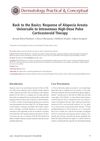 2 citations,
November 2020 in “Der Hautarzt”
2 citations,
November 2020 in “Der Hautarzt” A patient's hair loss may be linked to their diabetes medication, Sitagliptin.
 9 citations,
July 2011 in “Scientific Reports”
9 citations,
July 2011 in “Scientific Reports” Changes in the HR gene have influenced hair growth and may lead to hair loss conditions in humans.
26 citations,
October 2002 in “Journal of Investigative Dermatology” A specific gene mutation causes congenital hair loss.
 1 citations,
October 2021 in “Deleted Journal”
1 citations,
October 2021 in “Deleted Journal” Dupilumab can help regrow hair and improve skin conditions in patients with severe atopic dermatitis and alopecia areata.
 163 citations,
November 2003 in “Journal of Investigative Dermatology”
163 citations,
November 2003 in “Journal of Investigative Dermatology” Low iron levels may be linked to some types of hair loss in women.
 October 2021 in “Dermatology practical & conceptual”
October 2021 in “Dermatology practical & conceptual” High-dose corticosteroids can significantly regrow hair in severe alopecia areata.
 May 2018 in “European Journal of Dermatology”
May 2018 in “European Journal of Dermatology” The first Japanese family with Marie Unna hereditary hypotrichosis showed hair condition improvement in a child and highlighted the risk of misdiagnosis.
 19 citations,
January 2018
19 citations,
January 2018 Most people with alopecia areata have nail changes, which are common but don't greatly affect their quality of life.
 5 citations,
June 2015 in “Veterinary dermatology”
5 citations,
June 2015 in “Veterinary dermatology” A dog with complete hair loss regrew most hair after treatment, with no relapse after stopping treatment.
 39 citations,
April 2016 in “Case Reports in Dermatology”
39 citations,
April 2016 in “Case Reports in Dermatology” Tofacitinib temporarily regrew hair in a man with alopecia, but its effects didn't last.
 24 citations,
June 2016 in “Acta dermato-venereologica”
24 citations,
June 2016 in “Acta dermato-venereologica” Tofacitinib helped a young woman's severe hair loss and arthritis but not her plaque psoriasis.
 26 citations,
October 2016 in “Case Reports in Dermatology”
26 citations,
October 2016 in “Case Reports in Dermatology” A man with severe hair loss saw hair and nail improvement after 10 months on tofacitinib without side effects.
January 2025 in “Dermatology Online Journal” The man's hair loss and skin papules were diagnosed as atrichia with papular lesions, not alopecia areata universalis.

COVID-19 may trigger or worsen rapid hair loss in alopecia areata.
14 citations,
June 1989 in “Journal of dermatology” Three siblings had both Vohwinkel's disease and congenital alopecia, with no effective treatment.
 January 2023 in “Journal of The American Academy of Dermatology”
January 2023 in “Journal of The American Academy of Dermatology” Baricitinib helped most teenagers with severe hair loss regrow hair and had mild side effects.
 March 2014 in “Journal of The American Academy of Dermatology”
March 2014 in “Journal of The American Academy of Dermatology” Cortexolone 17a-propionate may be an effective new treatment for hair loss.
 85 citations,
October 2012 in “Dermatologic Clinics”
85 citations,
October 2012 in “Dermatologic Clinics” Alopecia Areata is an autoimmune condition often starting before age 20, with varied treatment success and a need for personalized treatment plans.
 3 citations,
March 2023 in “JAAD case reports”
3 citations,
March 2023 in “JAAD case reports” Upadacitinib cleared scalp alopecia areata in three patients and also improved atopic dermatitis with minimal side effects.
 14 citations,
January 2014 in “Journal of Cutaneous and Aesthetic Surgery”
14 citations,
January 2014 in “Journal of Cutaneous and Aesthetic Surgery” Scalp Roller therapy helped improve hair growth in patients with hard-to-treat alopecia areata.
 November 2023 in “Journal of Cosmetic Dermatology”
November 2023 in “Journal of Cosmetic Dermatology” Tofacitinib is effective and has minor, reversible side effects for treating severe hair loss in Iran.
3 citations,
March 2012 in “Journal of the Egyptian Public Health Association /Journal of the Egyptian Public Health Association” General practitioners in Qassim have satisfactory knowledge of alopecia areata but need more education to address gaps and misconceptions.
3 citations,
May 2023 in “Journal of the American Academy of Dermatology” Certain drugs can cause hair loss, but stopping the drug usually leads to hair regrowth.
 71 citations,
March 2009 in “Seminars in cutaneous medicine and surgery”
71 citations,
March 2009 in “Seminars in cutaneous medicine and surgery” Alopecia areata can cause unpredictable hair loss, and treatments like corticosteroids and minoxidil may help but have varying side effects.
 80 citations,
October 1983 in “BMJ”
80 citations,
October 1983 in “BMJ” Minoxidil helps hair regrowth in alopecia patients, with 16 having good results and no side effects.
 101 citations,
November 1992 in “Archives of Dermatology”
101 citations,
November 1992 in “Archives of Dermatology” Steroids help hair regrowth, and minoxidil slows post-steroid hair loss, but effects are temporary.
June 2020 in “Journal of skin and stem cell” The patient's hair loss from alopecia totalis returned despite initial successful treatment.
 January 2012 in “Elsevier eBooks”
January 2012 in “Elsevier eBooks” Hair loss can cause emotional and social issues, and various treatments, including medication, surgery, and psychological support, are needed.
 1 citations,
November 2017 in “Dermatologic therapy”
1 citations,
November 2017 in “Dermatologic therapy” JAK inhibitors show promise as a future treatment for hair loss.
 15 citations,
March 2014 in “Body Image”
15 citations,
March 2014 in “Body Image” Wig users with alopecia do a lot of emotional and practical work to make their wigs look natural and manage how others see them.
























